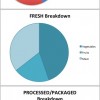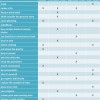Consistent Grocery Budget Fail
Confession: We have exceeded our grocery budget every month since September. Several of our budget categories, including groceries, are supposed to be a maximum amount spent, with whatever is left over at the end of the month to be transferred into savings. Instead, for groceries we have had to take from other budget categories to cover it. How did we get into this mess and why haven’t we turned it around?
Last May we lowered our grocery budget from $380 to $300 and decided to eat down our pantry. In May we spent $330, but we came in under budget in June through August. In July we only spent $157! (July was the month we really made a concerted effort to eat down the pantry.) But every month since we’ve been over, between $4 and $168! The problem seems to be worsening with time.
In reflecting on what’s been going on through this period, I came up with a few possible reasons why we might be spending more in this category:
- our CSA season ended in September so we had to make up the produce and meat that we had received at the grocery store – but this was less than $50/month
- I ended a weight-loss push in November and switched to eating more vegetables and meat (expensive!) and snacking more
- I stopped making meals for us in our slow cooker, which I think are rather filling and can be made with cheaper ingredients
The main problem, though, is just that we’re unwilling to cut ourselves off when we reach our budgeted limit. Let me rephrase – I think I’m more of the “problem” here because Kyle is more willing to cut himself off than I am. I eat more than half of our grocery spending and I find it likely that I am the one who has been increasing my food-money intake in the past few months. I have a goal to eat a minimum number of servings of fruits and vegetables per day and I don’t hold canned or frozen vegetables in very high regard, so I end up buying fresh produce at least once a week and won’t substitute when we run out of budget.
I tried to brainstorm a few solutions, but haven’t hit on one I really like:
- reduce waste – Actually, we aren’t really wasting food, or at least are doing it much less than we used to. I read American Wasteland last year and it really got to me. We largely used to waste produce but now that I’m eating so much of it it’s not a problem.
- implement meal planning – This is a little complicated for us because Kyle and I largely don’t eat the same foods. We also don’t keep regular work schedules and so don’t have time to cook a big meal a lot of nights (unpredictably). I’m not sure how this would help exactly if not by reducing waste since we don’t coupon/pay attention to sales.
- find a lower-cost source of groceries – I’m actually not sure if we can get cheaper food by using Costco more. We already buy a ton of stuff there and we still seem to be spending a lot of money. We checked out Aldi a few months ago and didn’t find it an overall better value than Costco, but we haven’t yet checked out Trader Joe’s. Several months ago I kept a pricebook and concluded that Costco had the better value on pretty much every item we buy there, but I can re-evaluate now that our shopping lists have changed some.
- buy less expensive food – Kyle is always telling me that “my” food is too expensive, but I know my body won’t react well to going back to eating cheap grains. This is another point where I think it’s justified to spend more in my top five value areas.
- buy seasonally – We could go to the farmer’s market for more produce and avoided higher-priced imported produce.
Until we figure all this out, I think we need to bite the bullet and increase our grocery budget. I think meal planning may be our best solution going forward, at least for me. I have been thinking of starting to track my food intake again anyway so they will go hand-in-hand.
What do you do when you encounter sustained over-budget categories? What have you done to cut down your grocery spending? Can you point out where I’m making excuses instead of finding reasons?


 Grocery Challenge Update for January 2013
Grocery Challenge Update for January 2013 Taking Control of Our Grocery Spending
Taking Control of Our Grocery Spending Grocery Challenge Update for February 2013
Grocery Challenge Update for February 2013 How to Cut Your Food Spending – Reducing Grocery Costs
How to Cut Your Food Spending – Reducing Grocery Costs


We too have had to increase your grocery budget after being a little bit over for most of the summer and fall. I think groceries have just gotten slightly higher and higher the past few months. So don’t beat yourself up too much. 🙂
Glad to hear we’re not alone. Perhaps the increase in prices, loss of the CSA share, and shift to more meat can account for it all. I suppose I could look back at my pricebook/receipts to compare last summer with now.
Our food budget is generally $300 too, most of the time we go over by a bit, but not by a lot. One thing you could consider is combining groceries and eating out, because sometimes you eat out more one month and spend less on groceries and vice versa.
I noticed that pattern too a few years ago, but recently we’ve been in a stable pattern of hardly eating out at all. Our dining out budget is currently $60/month and we hardly ever meet it. But considering that a grocery $ goes at the very least 3x further than an eating-out $, I doubt this is a big factor in going over budget recently.
How do you stay consistent in your spending month-to-month?
How about just increasing the budget to reflect what it takes to eat healthy? I’m guessing you’re really not being irresponsible with your shopping habits – though meal-planning and refusing to waste, I agree, are musts. If three *healthy* meals costs $6/day *each* with your shopping habits, then I don’t see why your budget would be less than $360 a month. Besides, it’s an investment towards staving off the doctor later in life.
We often make a few huge batches of food on weekends and package them in individual pyrexes, stored in either the fridge or freezer. This helps with meal planning when we have a busy week and won’t be able to enjoy dinner around the table.
I’m curious if your farmers’ market is less expensive. I find, unless I score a good deal, that it’s on par with in-season organic food (which, understandably, gives most people sticker shock).
I’ve found that eating greens at *every* meal (yup, even breakfast…wilted arugula – yum!) helps reduce my need for a large portion of protein. So I’ll fill up more easily on the veggie servings. haha, I’m not sure how long I’ll be able to keep it up, though!
Also, I stop by our coop for fresh produce THREE times a week. I find I’m more inclined to eat the lettuce and veggies when they’re fresh! And I agree about the canned stuff – YUCK!! But I think frozen can be a great option, and just as healthy – though not always cheaper.
Anyway – here’s inspiration – my best friend feeds her family of four (two-year-old twins) on $60/week. But she coupons only like a stay-at-home mom could, and I’m not sure how much produce they really afford.
Yes, we do need to just increase the budget instead of going through this stress!
I used to make lots of meals in our slow cooker and would package them to eat throughout the week, but with my maybe-Paleo shift I dropped beans from my diet and that eliminated my go-to slow cooker meals (chili and split pea soup). I’m considering going back to how I was eating last summer though, so I could start with my slow-cooker meals.
My issue with frozen food isn’t so much that I don’t like it but rather that I tend to forget about it until it’s freezerburned and it goes to waste!
Honestly, I don’t know how much couponing would help us. I suppose I can look closely at our receipts because maybe I have an incorrect perception, but we buy so much from Costco and almost everything we get at our regular grocery store is produce so my understanding is that little to no coupons would apply to those items. Maybe I’ll look more into it. Meal planning first though.
I agree with other poster that it’s essential to spend more on quality food. So, I’d consider cutting back on something less important from my budget and, increase food budget to eat healthy.
Definitely buying lower-quality food isn’t really an option. I have been thinking of going even higher-quality as in grass-fed meat, greater proportion of local/organic produce… But if $300 or so is giving us trouble we will definitely have to cut back on some other high priorities to get that type of food. Choices, choices!
Actually, Trader Joes is much more reasonable than I thought when I first got here. Not sure how it compares to Costco, but it does have a nice variety and is reasonably/inexpensively priced.
Plus you don’t have to buy in bulk, which is nice for some things.things
I think the reason we haven’t checked it out yet is that we know we can’t get all our groceries there, and Harris Teeter is walking distance from our apartment. 🙂 We made it out to Aldi though so no reason why we can’t find time for Trader Joe’s.
[…] and I have to do a massive budget overhaul for next month. We need major edits in groceries, tithe, cars, and travel and minor edits in several other categories. Of course there are always […]
Costco is cheaper than regular grocery prices, but a lot of the time it is more expensive than grocery sale prices. I don’t coupon, but I do take a few minutes each week to look through our local stores’ circulars (Vons, Albertsons, Ralphs). Although, depending on your time (and car) constraints, the extra effort of driving to another store might not be worth it.
Oh yeah, good suggestion – I kind of forgot those existed online. If I am going to start meal-planning (I’m dipping my toe in this week) the circulars could really be useful. There are two grocery chains relatively close to us and two more types within reasonable, perhaps once-monthly driving distance, in addition to Costco, so I’ll probably just start with the two close ones.
[…] we spend on groceries has been determined by how much we do/can spend on groceries. Last year we tried to cut back to $300/month on groceries but realized that was too low, so we reworked the rest of our budget to allow us up to […]
[…] includes drugstore items): We had an unusually low-spending month in terms of our groceries. We were regularly overspending our $300/month budget so we increased it to $360/month a few months ago and that’s been much more reasonable for us. […]
[…] our yet-unincorporated cost-of-living raises from September. Looking back in Mint, it seems that our grocery spending spikes every fall/winter – usually November, sometimes October or December. Maybe it’s the […]
[…] Kyle and I used to eat almost completely separate food […]